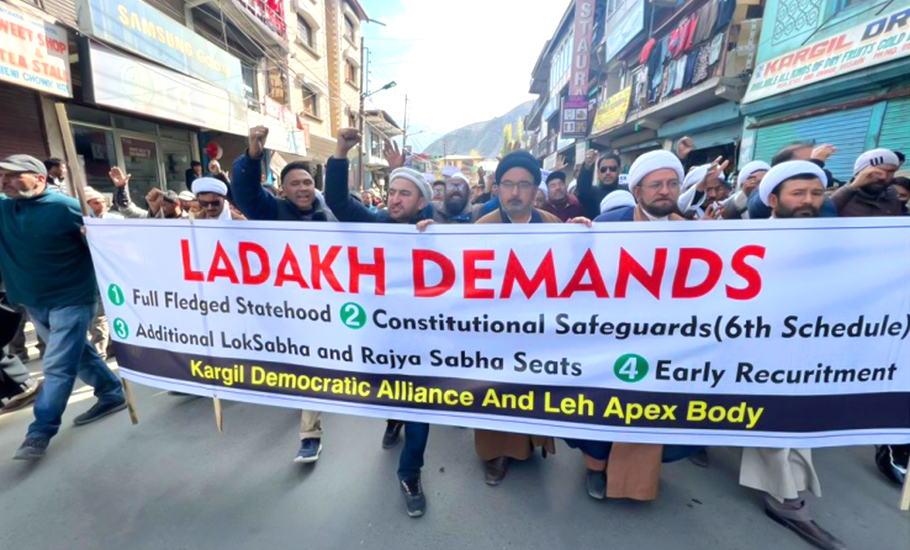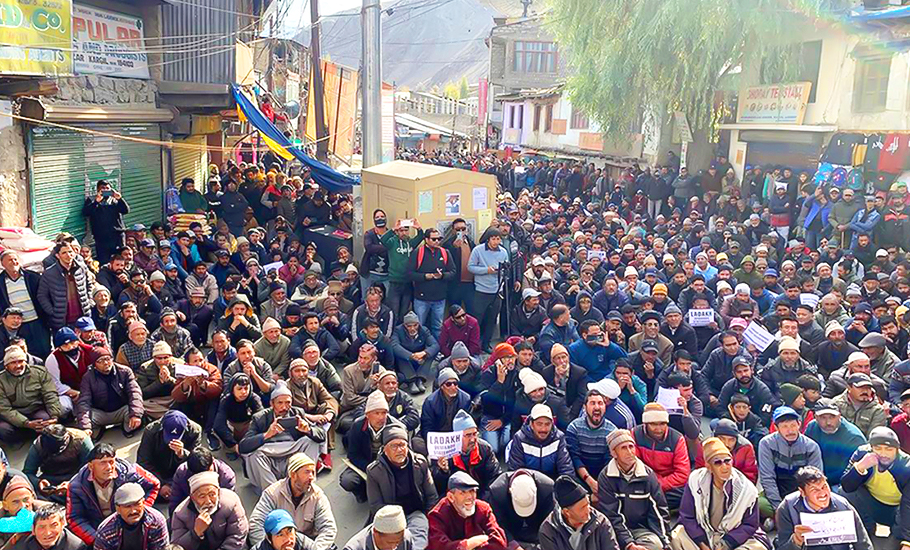
- Home
- News
- Analysis
- States
- Perspective
- Videos
- Education
- Entertainment
- Elections
- World Cup 2023
- Features
- Health
- Business
- Series
- Economy Series
- Earth Day
- Kashmir’s Frozen Turbulence
- India@75
- The legend of Ramjanmabhoomi
- Liberalisation@30
- How to tame a dragon
- Celebrating biodiversity
- Farm Matters
- 50 days of solitude
- Bringing Migrants Home
- Budget 2020
- Jharkhand Votes
- The Federal Investigates
- The Federal Impact
- Vanishing Sand
- Gandhi @ 150
- Andhra Today
- Field report
- Operation Gulmarg
- Pandemic @1 Mn in India
- The Federal Year-End
- The Zero Year
- Premium
- Science
- Brand studio
- Home
- NewsNews
- Analysis
- StatesStates
- PerspectivePerspective
- VideosVideos
- Entertainment
- ElectionsElections
- Sports
- Loading...
Sports - Features
- BusinessBusiness
- Premium
- Loading...
Premium

All is not well in Phunsukh Wangdu’s Ladakh and the BJP should worry

Beneath the tranquil visage that Ladakh presented to its unending stream of visitors there was, for a better part of the past few decades, an inert discontent waiting for that one jolt that would turn this latent anger into a juggernaut of ineluctable unrest. Years of administrative neglect, betrayal by elected representatives and frustration over the incapacity of the political class in...
Beneath the tranquil visage that Ladakh presented to its unending stream of visitors there was, for a better part of the past few decades, an inert discontent waiting for that one jolt that would turn this latent anger into a juggernaut of ineluctable unrest.
Years of administrative neglect, betrayal by elected representatives and frustration over the incapacity of the political class in New Delhi, or even in Srinagar and Jammu, to grasp and acknowledge their aspirations had made many Ladakhis believe that a remedy for their problems lay in bifurcation from J&K. Being carved out as a separate Union Territory would finally give Ladakh’s people autonomy over their fate, land and resources.
This, perhaps, is one reason for the jubilation that Ladakh, more specifically the district of Leh, witnessed in the immediate aftermath of the Narendra Modi government’s decision of August 5, 2019 to read down Article 370 and, two months later, formalise the bifurcation of Ladakh from J&K – making the former a Union Territory without a legislature and the latter a Union Territory with one. However, that old cliché – be careful what you wish for – began playing out soon after.
The residents of Muslim-dominated Kargil were upset at their district being merged into the UT of Ladakh instead of continuing to be a part of J&K. Those in Buddhist-dominated Leh realised that a UT without a legislature would leave them at the mercy of bureaucrats and what little pressure they could exert on elected representatives in the past had now been neutralised. For a while, this division between Kargil and Leh worked to the BJP’s advantage as it also prevented any demands for Ladakh’s statehood, considering that neither district wanted the other to have greater political control over the region.

Realising that the BJP was exploiting these divisions to undermine any campaign for course correction in Ladakh, political leaders and civil society representatives from Leh and Kargil who had come together under the aegis of the Kargil Democratic Alliance (KDA) and Leh Apex Body (LAB), respectively, buried their personal differences to launch a united fight for their rights.
Troubleshooting mandarins of the Modi government sought to contain the public anger from boiling over by promising that the inclusion of Ladakh, a UT with nearly 97 per cent population of tribal people, under the Sixth Schedule of the Constitution was on the cards. The Ladakhis were told, by their Lok Sabha MP, the BJP’s Jamyang Tsering Namgyal, that once amendments are made to the Constitution to ensure this, they would get greater autonomy over administration and safeguards for their rights like residents of the tribal areas in Assam, Meghalaya, Tripura and Mizoram who are presently protected under the Sixth Schedule.
Over three years later, the Ladakhis are still waiting for the Modi government to come true on that promise. Their patience is now wearing out. On January 26, one of Ladakh’s most renowned natives, innovator and climate activist Sonam Wangchuk – known to most as the inspiration behind the character of Phunsukh Wangdu, portrayed by Aamir Khan in Rajkumar Hirani’s 2009 blockbuster 3 Idiots – launched a five-day ‘climate fast’ to draw attention to the environmental crisis looming over Ladakh and pressed for the UT’s inclusion under the Sixth Schedule.
The Ladakh administration denied Wangchuk permission to sit on his protest fast at Khardung La, among the world’s highest motorable passes situated at an altitude of 18,380 feet, on grounds that doing so would endanger his life as temperatures there were then hovering around minus-40 degree Celsius. Wangchuk was placed under detention at his Himalayan Institute of Alternatives Ladakh (HIAL) campus in Phyang but his protest and considerable fan following on social media platforms told the world that ‘All Is Not Well’ in Phunsukh Wangdu’s homeland.
Wangchuk can be credited with forcing the world to take note of the unrest brewing in remote Ladakh but to view the crisis only through his lens would also be a travesty of the fight that thousands of faceless Ladakh residents have been waging for their rights for the past three years.
On January 27, a day after Wangchuk began his climate fast, a huge crowd, comprising predominantly of young Ladakhis, had gathered in Leh’s NDS Sports Complex where Ladakh’s Lieutenant Governor RK Mathur was to preside over as chief guest for the LG Ice Hockey Cup final match between the ITBP and Ladakh Scouts teams. The venue witnessed sloganeering against the Centre and the LG and demands were made for expediting Ladakh’s inclusion under the Sixth Schedule.
What followed did not attract a fraction of the attention that Wangchuk had drawn with his protest. Sources say the local police scanned through video footage of the match – it was also being streamed live on Facebook – to identify three students who ostensibly led the sloganeering. The students were detained at the police station in Leh, their parents summoned too, and a terse warning of strong action was issued to them if they were to protest again. It was only after Chering Dorjay, a former BJP minister in the erstwhile state of J&K, intervened that the police released the students.

The Federal tried to speak to the students to get their account of what transpired at the police station but was informed that an “informal gag order” had been slapped on them by the cops to prevent them from revealing whatever happened during their detention.
On Sunday (February 12), Mathur’s over three-year long tenure as Ladakh’s first LG came to an abrupt end with Brigadier (retired) BD Mishra being appointed as his successor. If the political grapevine in Ladakh is to be believed, Mathur’s summary dismissal was the result of his failure in containing the anti-BJP protests and social unrest that has been steadily gaining pace across the UT over the last few months.
Notably, former Congress president Rahul Gandhi, during the course of his Bharat Jodo Yatra in J&K had also extended “full support” to the demand for Ladakh’s inclusion under the Sixth Schedule. Gandhi had, in December 2021, tried to move an adjournment motion in the Lok Sabha demanding statehood for Ladakh and its inclusion under the Sixth Schedule but his notice for discussing the issue wasn’t accepted by Speaker Om Birla.
The BJP, say sources, believes that Rahul’s steadfast support to the agitating Ladakhis would only create further political challenges for the ruling party in Ladakh. By replacing the hugely unpopular LG, Modi, say sources, has tried to make another damage-control move. Mishra has been advised to make conciliatory gestures towards the LAB and KDA. However, the BJP also realises that it would take time for Mishra to reverse the anti-BJP sentiments that have already taken deep roots across Ladakh, including in Leh, which the saffron party had aggressively wooed over the years.
On Wednesday (February 15 ), a group of Ladakhi activists had descended at Delhi’s Jantar Mantar to press for their demands, which include granting Sixth Schedule status to the UT, setting up of either a legislature or autonomous district councils in Leh and Kargil to ensure accountability of elected representatives and limit bureaucratic hegemony and reviewing plans for a slew of infrastructure and energy projects that the Modi government wants private players such as Gautam Adani’s Adani Greens to set up across Ladakh. Their anger against the BJP was palpable and several protesters present at Jantar Mantar also spoke about Modi “selling out Ladakh to Adani” – a charge that would clearly touch a raw nerve with the Prime Minister given the ongoing political kerfuffle over the Hindenburg Report’s allegations against the Adani Group.
The Centre has been claiming that exploitation of Ladakh’s wealth of natural resources would ultimately benefit the UT’s population as the massive projects envisaged for the region will create new employment opportunities, build a robust infrastructure network and generate revenues that can then be utilised for further welfare initiatives. The Union Budget, presented by finance minister Nirmala Sitharaman on February 1, days after the incident at the NDS Sports Complex and conclusion of Wangchuk’s climate fast, indicated that the Centre would provide Rs 8,300 crore towards a Rs 20,700 crore project for building an “inter-State transmission system for evacuation and grid integration of 13GW renewable energy from Ladakh”.
The Congress and other Opposition outfits allege that Sitharaman’s budget announcement is tailor-made to benefit the Adani Group, which has been expanding its footprint in the energy sector, and that the ultimate losers in this Modi-Adani partnership would be the people of Ladakh. It’s a charge that has already found currency among ordinary Ladakh residents. Moreover, the Ladakhis see as a bane what the Centre claims would be a boon for them.
“How can Ladakh survive ecologically and culturally if these huge projects come up here… the government is succumbing to corporate pressure. We will fight, raise our voice and generate huge public opinion against these projects,” said Wangchuk, who now admits he was wrong to celebrate Ladakh’s bifurcation from J&K. The Ramon Magsaysay award winner, whose political ambitions have been a matter of discussion ever since he launched his fledgling New Ladakh Movement party but failed to win any seat in the 2015 Ladakh Autonomous Hill Development Council (LAHDC), Leh election, has now agreed to get affiliated with LAB.
What should worry the BJP, and perhaps already does, is that Wangchuk and other prominent political and social figures of the UT are trying to build up their campaign for Ladakh’s inclusion under the Sixth Schedule as a BJP versus Ladakh issue. This was evident at the massive reception organised by Leh locals for Wangchuk when he ended his climate fast on January 30.
Padma Stanzin, president of the Ladakh Students Association, who was among the speakers at the reception which reportedly drew an audience of 10,000 people, declared that the BJP was standing between the people of Ladakh and the rights they deserve under the Sixth Schedule. Stanzin told The Federal that he also sees the Centre’s push for infra projects in Ladakh as a threat not just to the region’s fragile ecology but also to the demography, culture and traditions of Ladakh.
“We need to safeguard our identity, our culture and also our environment. These power projects will endanger all of these because on one hand all the construction they’ll require will harm the ecology while on the other, the influx of outsiders who will settle in Ladakh due to these projects will disturb Ladakh’s demography and traditions… we are already seeing this even with the booming hospitality industry of Ladakh as locals are not being given permissions for building hotels,” Stanzin said.
Given the public sentiment, even erstwhile BJP loyalists have taken up cudgels against the Centre. “It was our BJP MP Jamyang Tsering Namgyal who first proposed Ladakh’s inclusion under the Sixth Schedule, so we fail to understand why the government has taken a U-turn on this issue… We met home minister Amit Shah with our demands but he was non-committal,” says Chering Dorjay.
A former BJP minister for Ladakh Affairs and Cooperatives Department in the erstwhile PDP-BJP government, Dorjay alleged that the Centre was proposing power projects, like the 10 GW green energy project in Pang, without consulting locals or factoring in its impact on the environment. “The area where the project (expected to be spread across 20000 acres of land) is proposed to come up at is a breeding ground for our goats but our consent and view have not been sought… we are not against investment and infrastructure but these should not come at the cost of our environmental and our livelihood,” Dorjay told The Federal.
The local BJP leadership has, expectedly, rejected criticism of the Centre working against Ladakh’s interests. “Who says we don’t want constitutional safeguards… Guarantees about the Sixth Schedule can be given but everyone has to first come to the talks table,” former Ladakh Buddhist Association president and current BJP spokesperson PT Kunzang told The Federal. Kunzang also dismissed the concerns being raised over ecological damage as being politically motivated, asserting that “climate change is a global phenomenon but mixing it with local issues isn’t good.”

